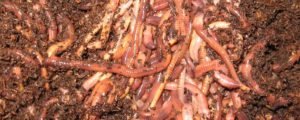Worm Farming Has Benefits
Worms may well become one solution to environmental problems and lack of nutrition in the soil. Epigeic earthworms have the capability of converting otherwise waste products into a valuable soil amendment. In fact all worms work to improve soil but the epigeic species are the easiest to work with for composting.
Perhaps I should "step back for a second for anyone new to worm composting and explain the 3 types (broad categories) of earthworms.
- Anecic worms are your "dew worms" or "fishing worms" these burrow deep into the earth and feed largely on soil. Some pull organic materials deep into the soil. They breed slowly and don't do well in a compost bin.
- Endogeic worms burrow more horizontally in the top regions of the soil. These are nature's rototillers. They breed faster than anecic worms but prefer things like leaf litter to food waste. They are much slower to create good compost than epigeic worms.
- Epigeic worms are the true composting worms. Epigeic means "above the soil" and these worms live in organic material laying on top of the soil, they rarely burrow and if they do it's very shallow. They love to eat manure, rotting food waste, leaf litter, old grass clippings and virtually any dead, rotting organic material. They quickly turn this all into castings "worm poo" which is a fine compost.
Some of you might think that worm composting is not really a good idea. But before you dismiss the idea, take a break, open your mind and hear out some of the advantages of the now-becoming-popular worm composting technique.
Number 1: Flexible: Indoors or Outdoors, Take Your Pick
Whether you want to have your worm compost indoors or outdoors, it does not really matter. You can have them in either or both areas. The good thing is that you won’t even have to sweat too much with your worm compost.It doesn't require frequent turning or monitoring of temperature like other methods. Worms are compliant workers that make compost day in and day out, for relatively no charge. You only have to feed them to keep them in top condition.
Number 2: All it needs is moist bedding and waste material.
Worms like moisture, and you need a stable bedding material as a "safe zone" from heating or fermentation. Home worm farmers often use cardboard, paper or leaves (or a combination). Commercial farms I've seen often use peat moss, coco coir, sugarcane bagasse or pre-composted manures. Home farms usually begin with food scraps as food, commercial farms often use manure.
Number 3: Worms are readily available and are not that hard to cultivate.
With growing popularity obtaining composting worms has become easier. It is possible to harvest compost worms in some areas by digging around manure piles at a local farm. If this is too yucky there are plenty of places online to buy worms now and have them sent right to your mailbox. Use a little caution buying online there are some scoundrels out there sending less worms than they claim. I'd say don't necessarily buy from the first ad that pops up, that only means they are spending the most on advertising. It is possible to get started free or cheap too.
Number 4: Aside from the yuck factor, the worms will happily do the work; you only have to manage them.
You will act more as a manager than a laborer with a worm farm. You will do minimal work for such positive results. You get support from governments and people worldwide regarding worm composting. Social media like Facebook, Pinterest and Twitter have many people willing to help out. In some communities, it is already being implemented and widely promoted to have worm composting in the home.
Number 5: Mobile
One thing worm composting that other composting techniques don’t have is the mobility. You can take it with you anywhere, assuming that you have a small scale composting setup, you can take it with you if you move.
Number 6: Helps the environment
When organic material is put in a landfill or manure is left in a pile to rot, it produces methane (a gas scientists claim is worse than carbon dioxide as a greenhouse gas. Composting and worm composting actually traps carbon in itself and ultimately in the soil of your garden instead of releasing it as CO2 into the atmosphere.
Conclusion
Worm composting has a number of benefits to both the household and mankind. Deciding to compost with worms and grow our own gardens is a responsible activity and once you start you'll be advocating it to your friends.
Posted from my blog with SteemPress : https://thebluewormbin.com/worm-farming-has-benefits/
